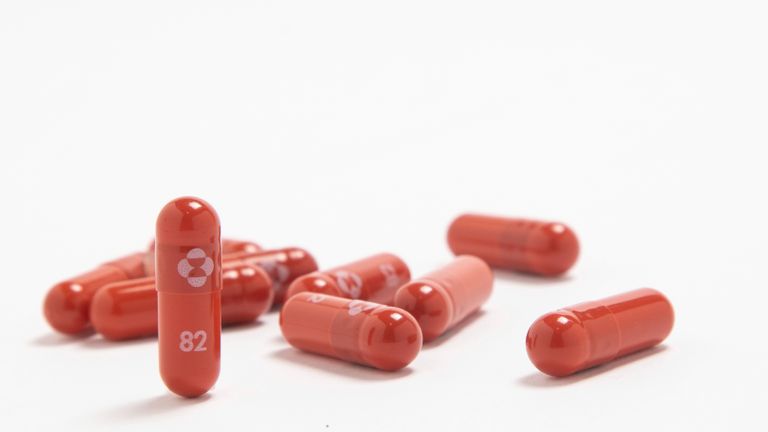
Pfizer’s new experimental COVID-19 antiviral pill cuts the risk of hospitalisation or death by 89%, the company has announced.
The results appear to surpass those seen with Merck & Co Inc’s pill Molnupiravir, which was shown last month to halve the likelihood of dying or needing hospital treatment for COVID-19.
On Thursday, the UK became the first country to approve Molnupiravir for use.
England’s R number revealed – follow live updates
Full trial data is not yet available from either company and experts warn against comparing preliminary results because of differences in studies.
The drugs will follow Favipiravir, which is currently available in the UK and has treated 1.7 million people around the world for coronavirus.
Favipiravir, from AiPharma, was approved by the MHRA on 3 November 2020 and is taken when symptoms first present to stop the virus from replicating.
Pfizer plans to submit the interim trial results to the US Food and Drug Administration as part of an emergency use application.
It will ask international regulators to authorise the pill as soon as possible and a decision could be made by the FDA within weeks or months.
The results came from a study of 775 adults. Patients taking the company’s drug, along with another antiviral, had an 89% reduction in their combined rate of hospital admission or death after a month, compared to patients taking a placebo.
Fewer than 1% of patients taking the drug needed to be admitted to hospital and no one died.
Participants were unvaccinated and had mild-to-moderate COVID-19, and were considered high risk due to health problems, including obesity, diabetes or heart disease.
“We were hoping that we had something extraordinary, but it’s rare that you see great drugs come through with almost 90% efficacy and 100% protection for death,” said Dr Mikael Dolsten, Pfizer’s chief scientific officer.
Few details were given about side effects, but Pfizer said rates of problems were similar between the groups.
While top US health officials continue to stress that vaccination is the best way to protect against infection, tens of millions of adults remain unvaccinated in America.
The country has approved one other antiviral drug for Covid-19, Remdesivir, and authorised three antibody therapies that help the immune system fight the virus, but they have to be given by IV or injection and supplies have been limited by the last surge of the Delta variant.
The Merck drug works by interfering with the coronavirus’s genetic code, a novel approach to disrupting the virus.
Follow the Daily podcast on Apple Podcasts, Google Podcasts, Spotify, Spreaker.
However, Pfizer’s drug is known as a protease inhibitor which blocks a key enzyme that viruses need to multiply in the human body.
Part of a decades-old family of anti-viral drugs, the drug – which has not yet been named – was first identified during the Sars outbreak that originated in Asia in 2003.
Pfizer shares were up 8% in New York following the news of the drug’s success, with those of Moderna and Novavax down 21% and 13% respectively.
AstraZeneca shares in London were just 1.6% lower.






More Stories
5 Reasons Why Everyone Should Look Forward to Save Earth Mission’s Takeoff Event
Save Earth Mission’s Takeoff Event Countdown Starts: Get Ready to Witness History
The Save Earth Mission: A Global Movement Towards a Sustainable Future